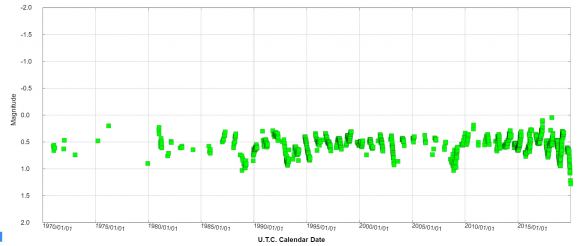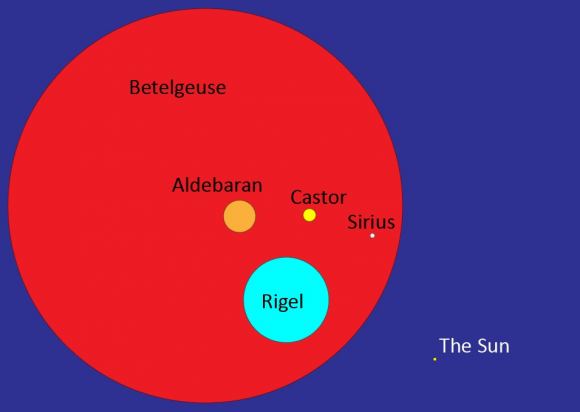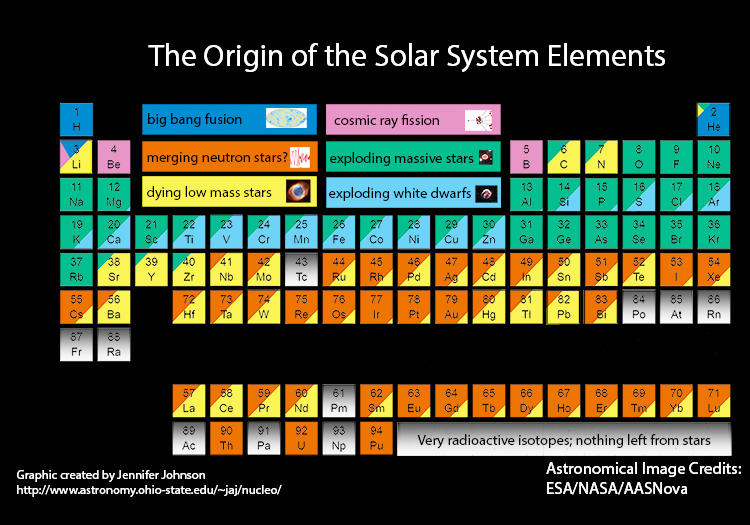General Discussion
Related: Editorials & Other Articles, Issue Forums, Alliance Forums, Region ForumsIs Betelgeuse, one of the sky's brightest stars, on the brink of a supernova?
One of the sky’s brightest lights is losing its shine.
Since the start of December, the star Betelgeuse — the gleaming right shoulder of the constellation Orion — has been rapidly growing dim. Just 650 light-years from Earth, it’s usually the ninth most luminous star in the sky. Right now, it wouldn’t even break the top 20.
Betelgeuse is a “variable” star, known for wild fluctuations in its brightness, but scientists have never recorded it changing quite so fast. Such strange behavior from a beloved star has them wondering: Is this a sign that Betelgeuse is about to explode?
Astronomers know that day is bound to come. Betelgeuse is at least 15 times more massive than the sun and wide enough that, if we moved it to our solar system, it would extend past the orbit of Jupiter. “Supergiants” like this tend to live fast and die young, and Betelgeuse’s red color indicates that it has already moved to one of the last stages of a star’s life: fusing helium atoms into ever-heavier elements, which it occasionally spews into space. The carbon in your cells and the oxygen in your lungs was made this way, borne across the universe on the sighs of a dying sun.
https://www.washingtonpost.com/science/2019/12/27/is-betelgeuse-one-skys-brightest-stars-brink-supernova/
htuttle
(23,738 posts)(and I have to say, I never thought I'd utter the above statement in seriousness...)
backscatter712
(26,355 posts)That is if that burst was pointed directly at Earth.
But last time I saw a documentary about Betelgeuse, astronomers had figured that the poles of that star weren't pointed towards Earth, so I doubt that's a danger.
Will make for a spectacular light show if it happens. Betelgeuse could blow any time... in the next 100,000 years...
Blue_true
(31,261 posts)We don't have any reason to be concerned. They way we are going, unless some awesome scientific discoveries happen, we won't be around in 100,000 years.
VMA131Marine
(4,138 posts)It’s not big enough. Long GRBs can come from Wolf-Rayet stars:
The closest analogs within the Milky Way galaxy of the stars producing long gamma-ray bursts are likely the Wolf–Rayet stars, extremely hot and massive stars, which have shed most or all of their hydrogen to radiation pressure. Eta Carinae and WR 104 have been cited as possible future gamma-ray burst progenitors.[90] It is unclear if any star in the Milky Way has the appropriate characteristics to produce a gamma-ray burst.[91]
https://en.m.wikipedia.org/wiki/Gamma-ray_burst
They are also produced by merging binary neutron stars and black holes.
backscatter712
(26,355 posts)So, IF Betelgeuse blows, the only thing I'll be needing is a telescope and a camera - I WILL want pictures!
greytdemocrat
(3,299 posts)It will be visible during the day if/when
it blows.
progree
(10,901 posts)We started seeing discussion on Betelgeuse trending on social media on the evening of Friday, December 20th, and dug down to the source of the excitement: a December 8th paper on "The Fainting of the Nearby Red Supergiant Betelgeuse" by researchers at Villanova University.
Light curve estimates courtesy of the American Association of Variable Star Observers (AAVSO) verified the assertion that the star had indeed faded about one magnitude, or a little over one half from its usual magnitude +0.5 to +1.5
Noticing the sky was clear, we headed up to our parking garage rooftop observing site in downtown Norfolk, Virginia to take a look. Betelgeuse was indeed noticeably fainter, about a shade dimmer than nearby +1st magnitude Aldebaran.
Magnitude of Betelgeuse, starting in 1970
https://www.universetoday.com/144465/waiting-for-betelgeuse-whats-up-with-the-tempestuous-star/
universetoday.com/wp-content/uploads/2019/12/Mag-est-580x246.jpg

Our (puny) host star, versus the neighbors, including Betelgeuse. Credit: Dave Dick
universetoday.com/wp-content/uploads/2019/12/starss-580x412.jpg

Betelgeuse is the yellow-orange (in this picture) star in the right shoulder of Orion (below)
Rigel is the intensely bluish left foot star
universetoday.com/wp-content/uploads/2019/12/49256912602_2251f44650_c.jpg

roamer65
(36,745 posts)I’d love to see it happen.
Hermit-The-Prog
(33,328 posts)I want to know what's happening with Betelgeuse TODAY!
NBC should send upChuck Toady out there with a camera and mic.
If we can put a man on the moon, why can't we have instant news from the stars?
![]()
0rganism
(23,944 posts)we want the current situation, not just some milquetoast 650 year old lightspeed report
maybe Chucky can tell us all about the toxic politics practiced on the surrounding planets on the day of the supernova and how much the residents enjoyed their tax cuts when their planet vaporized around them. educational tv that would be
blugbox
(951 posts)Than wherever was happening at the source.
I wouldn't mind sending him out there just to be sure though ![]()
Blue_true
(31,261 posts)it started the process of going supernova (a process that takes millions of years to fully complete that portion of a dying star cycle).
Response to Zorro (Original post)
Rainbow Droid This message was self-deleted by its author.
AZ8theist
(5,457 posts)If it DID "explode" "right now" ....we would never know. If it has already exploded, we won't know for 650 years since that's how far away it is.
It may already be toast, but we won't know for centuries. We are looking at the light (and gradual dimming) that happened many, many centuries in the past. It's only now reaching us. Heck, ANY star of great distance may be extinct "now" since we are seeing light from the distant past.
It's all relative. (pun intended...)
Response to AZ8theist (Reply #7)
Rainbow Droid This message was self-deleted by its author.
USALiberal
(10,877 posts)Response to USALiberal (Reply #14)
Rainbow Droid This message was self-deleted by its author.
AZ8theist
(5,457 posts)That thought never crossed my mind. All I wanted to do was expand on your point. And add some science to those on DU who are not science literate. There was nothing personal.
Response to AZ8theist (Reply #69)
Rainbow Droid This message was self-deleted by its author.
AZ8theist
(5,457 posts)I hope my explanation assuaged your fears.
Response to AZ8theist (Reply #83)
Rainbow Droid This message was self-deleted by its author.
Talitha
(6,582 posts)I've been an 'Amateur Astronomer' for quite a few decades
and would definitely LOVE to see this happen in our time! ![]()
Snackshack
(2,541 posts)And the light reach us in our lifetimes that would be an amazing sight to see.
Tommy_Carcetti
(43,177 posts)JHB
(37,158 posts)
PJMcK
(22,034 posts)And that's really saying something.
Calista241
(5,586 posts)Shrek
(3,977 posts)We should have warp drive by 2063 and we can just go and check.
USALiberal
(10,877 posts)MineralMan
(146,287 posts)Currently, it's already one of the brightest stars, ranked about 11th.
It's close enough to attain that status if it does go supernova.
If you don't already know where the star is located, you'll have no problem finding it if that happens.
It's located in the constellation Orion, and is the bright star at the top left of the constellation, above the easily noticed three-start Belt of Orion.
However, since few people really look at the sky at night any longer, most people won't notice anything at all.
Learn more at: https://en.wikipedia.org/wiki/Betelgeuse
USALiberal
(10,877 posts)MineralMan
(146,287 posts)I was a freelancer, but my wife was a staff member around the same time, although we didn't meet in connection with the magazine. I moved on to write for PC World for over 12 years.
SWBTATTReg
(22,113 posts)the memories. I have to laugh, because I'm not totally sure if I threw those magazines out or not, they may still be stored in my attic!
MineralMan
(146,287 posts)Too damned heavy to move all those boxes, and I never looked at them anyhow. I wrote software reviews and had a column in it on Word Processing for years.
Disaffected
(4,554 posts)as even a full moon.
Don't get your hopes up though - the chances of anyone now living seeing it are quite remote.
Extra coolness though if it happened on the day Drump leaves office.
MineralMan
(146,287 posts)Really, this could happen at any time in the next 100,000 years. Galactic time moves very, very slowly. The news reports exaggerate the chances by a lot.
backscatter712
(26,355 posts)It'll be brighter than the full moon. It would be one hell of a light show.
cwydro
(51,308 posts)I always look for him, no matter where I am.
MineralMan
(146,287 posts)cwydro
(51,308 posts)But I do remember having the constellations pointed out to me as a child.
Going to the local planetarium and so on. I loved that.
MineralMan
(146,287 posts)the North Star. From there, I can orient myself to find all sorts of other things in the sky.
cwydro
(51,308 posts)A shame if not.
MineralMan
(146,287 posts)that have always done that. But, I'm not sure. I don't know a lot of kids any more. I had a reflector telescope as a kid. It wasn't a great scope, but it served its purpose. I spent many hours in our small town back yard looking at things in the night sky. But, I was a science nerd. Most kids never did that, I'm sure.
cwydro
(51,308 posts)She never used it of course, but I did. ![]()
MineralMan
(146,287 posts)the sciences when it came to me. On every occasion for gifts, I got something that was STEM related. That acronym hadn't been created yet, but they thought I should be some sort of scientist, engineer, or doctor or something. I ended up with a degree in English, but I never lost my fascination with the sciences.
cwydro
(51,308 posts)I’m a bit younger than you, but my parents were the same about encouraging those interests.
I remember that fondly.
MineralMan
(146,287 posts)to making us do things. But, they provided all of the tools for whatever explorations we wanted to make. Then, they let us find our own paths to learning, pretty much. They also gave us increasing freedom as we got older, and didn't try too hard to keep us out of mischief. They had parenting down, for sure.
cwydro
(51,308 posts)Free range children lol. Now I think that’s frowned upon.
Forts in the woods, trees, games in creeks...good memories.
MineralMan
(146,287 posts)hover over their children way too closely. It stifles their development, I think.
I remember getting my first bicycle at about age 9. My dad said something like, "Here you go, son." I learned to ride it with the help of the neighbor kids. No training wheels or Dad helping. By the end of the day, I was riding just fine. I did fall a few times, but never mind. Some people would think that was too hands-off, but it wasn't really. I think I learned faster on my own, really.
cwydro
(51,308 posts)The brakes didn’t work, and we lived at the top of a hill.
Yes, just like you...fell a few times, really no big sympathy from mom at the time.
She told me to aim for the grass next time I thought I might fall. Learned pretty fast too!
I loved that little purple bike.
MineralMan
(146,287 posts)The first time, I went to my mother, who scrubbed my knee thoroughly with a washcloth before applying mercurochrome to it. It hurt like crazy. From then on, I took care of my own skinned knees and elbows. I was a lot more gentle about it, since I was doing it myself. Somehow, I never got an infection or anything. Maybe that's what she had in mind the first time. ![]()
cwydro
(51,308 posts)My parents were British, so they called a skinned knee a “grazed knee,” and whatever it was called, that treatment was the same.
God, I can still feel that sting!
hunter
(38,311 posts)Expect some surprises as well.
USALiberal
(10,877 posts)Blue_true
(31,261 posts)krispos42
(49,445 posts)Which would be awesome!
Demonaut
(8,914 posts)jeffreyi
(1,939 posts)And an official Dark Sky area is just to the east of my farm. Wow.
tblue37
(65,336 posts)SWBTATTReg
(22,113 posts)burned all exhausted? We know that the Hydrogen is already exhausted which is why Betelg. is so big, it's burning the helium (fusing them into other heavier elements). It would be nice to see a Supernova (I know that we've seen some already, but to see one as studied as much as Betleg. has been, means that we'll learn tons more about supernovas and the process that these undergo.
They had an article on YouTube about the dimming of Betelgeuse too, by the way if someone is interested in viewing. I saw it last night.
backscatter712
(26,355 posts)Red giants like Betelgeuse are know to vary quite a lot in brightness, so for all we know, this might be just a normal fluctuation.
But yeah, it's rapidly running out of gas. Like you said, it's already used up the hydrogen - turned it into helium. Now it's burning helium, and starting to make heavier elements like carbon and oxygen, which eventually get fused into even heavier elements..
And the cycle stops at iron - fusing atoms into iron consumes rather than releases energy. At that point, the fusion reaction at the star's core stops. The core collapses, then the outer layers collapse onto the core, with a gravity of millions of G's. Then the core and the collapsing layers get mashed into a plasma soup that's gazillions of degrees hotter than a normal stellar core, and that's when the star goes supernova, and that soup of plasma gets turned into most of the elements on the periodic table, and gets scattered across the galaxy.
SWBTATTReg
(22,113 posts)does finally go supernova! An unique opportunity to study the full range of what a star undergoes (relatively speaking since we've only started studying the heavens for about a century or more in detail (with better telescopes, other equipment). Now we have a whole array of satellites in space that we can turn and point at the supernova, should Betelg. finally go.
Blue_true
(31,261 posts)We would likely get hit with very powerful cosmic particle blasts at some point after the supernova happens. The most likely thing that is happening now is the star is moving along the fusion process toward the stopping point of Iron. Basically, if people are on earth millions of years from now, they likely won't see the moment the star went supernova, since each elemental fusion sequence takes millions of years and Iron is fairly deep in the Periodic Table.
SWBTATTReg
(22,113 posts)cosmic rays and such (very powerful cosmic particle blasts, your words)...by the time it travels over 600+ light years, it'll be weaken to the point that more than likely, no negative impacts to life here on earth other than a massive flood of neutrinos. I understand the process of why supernovas occur, and your guess is good as anyone else's as to when and if the supernova happens. And technically 650 light years is pretty far away, it would take us as a species hundreds of thousands of years to get there under today's technology and 650 light years is far enough away that the supernova won't negatively impact life on earth.
If it were 50 lys, yes, perhaps.
Blue_true
(31,261 posts)Although the radiation level would be well above normal levels (we are constantly getting hit with cosmic particles at a low level), it is likely the distance is far enough away that the increased level likely would only cause exposure illneses, but not wipe out species.
The part of the Orion Arm that we are located in is estimated to be 600-1400 light years thick, with us located at about the center. So the explosion would take place on about an outer edge of the Orion Arm section that we are located in, and would have to pass through a considerable amount of matter to reach us (if it had to pass through massless space, then we would be screwed, but that is not the case, fortunately).
Blue_true
(31,261 posts)determine how far along it is. Given that fusion to a particular element takes millions of years, if it is near the start of the cycle, we will never see a supernova. But if 99% of the star has fused to the stopping weight of Iron, then maybe we will see the star start the core collapse process (which could be where it is at now given that as the core collapses, it should suck in all except the most distant light from the core, and appear less bright as a consequence).
Blue_true
(31,261 posts)fusion and explodes. Based upon the wavelength of the light scientists are seeing, they should be able to determine how far along it is toward reaching the point at which it goes supernova.
Clash City Rocker
(3,396 posts)But I guess he would say...

lapucelle
(18,252 posts)Posted by Deborah Byrd in Space | December 23, 2019
The red supergiant star Betelgeuse – in the shoulder of the constellation Orion the Hunter – is one of the easiest-to-recognize stars in the night sky. It’s also one of the biggest stars we know, with a radius extending out to the distance of Mars’ from our sun, and possibly Jupiter! Plus, it’s famous for its name, featured in the movie Beetlejuice. And, as if those things weren’t enough, this star is also famous for the fact that it’ll someday explode and appear in our sky as a supernova, becoming visible in daytime and possibly outshining the moon at night.
In recent weeks, though, the chatter about Betelgeuse has been centered on something else entirely. Astronomers are excited about the fact that – since about October – this bright star has become noticeably dimmer. In the terminology of astronomers, the star is fainting.
What’s happening? Could it be a sign that Betelgeuse is about to explode as a supernova? Astronomers say probably not. Let’s consider the facts.
You can read the rest here:
https://earthsky.org/space/betelgeuse-fainting-probably-not-about-to-explode
Deborah Byrd's website is excellent for amateurs and hobbyists, and you can subscribe to her daily newsletter. She sums up every article with a "bottom line".
Thanks for the post, Zorro. I was going to wave, but in honor of your name I'll do this instead.
Blue_true
(31,261 posts)VMA131Marine
(4,138 posts)The life of a star like Betelgeuse is only about 10 million years to begin with.
Second, iron formation is the last stage in a star’s life. Once enough iron forms in the core, fusion stops like turning off a light bulb and the core implodes in a matter of seconds. This is what causes a supernova.
Blue_true
(31,261 posts)backscatter712
(26,355 posts)First, bear in mind that a star as big as Betelgeuse will turn into a black hole after the supernova blows. Millions of G's of gravity.
So. First, the star runs out of fuel - everything in the core's fused to iron, and as you mentioned, fusion stops very quickly.
The core collapses. To something resembling a neutron star.
But light only goes so fast, and this is a star so big that in our own solar system, it will consume Mercury, Venus, Earth, Mars, and maybe Jupiter, and its outer layers go almost out to Saturn. It takes a bit before the radiation from the core stops reaching the next layers out.
Then when that core radiation stops, those next layers, which were being pushed out by the intense radiation and heat, start falling inwards. Pulled by millions of G's of gravity (like I said, this is a really huge star), and I'm estimating that the fall is from a few million miles out from the core. When the surrounding layers hit the core, they will be traveling at a quarter of the speed of light.
That matter slams into the core, with the force of gazillions of nuclear bombs, and it will compress the core, until electrons and atomic nuclei get mashed together. Electrons collide with protons, turning them into neutrons, like in a neutron star, and release huge numbers of neutrinos.
Most of the neutrinos radiate outwards, and some of them will spike neutrino detectors here on Earth 650 years later. But enough are released that a fraction of a percent of them will hit the next surrounding layers of the star's plasma, and heat them up.
And that is how one of the most powerful explosions in the universe short of the Big Bang itself happens.
Buckeyeblue
(5,499 posts)In some ways it's overwhelming and a little sad. We worry so much about things that are inconsequential. And in another sense I find it to be a huge relief. What difference does it make if I spend a lot of time farting around?
Blue_true
(31,261 posts)significant than we actually are.
Buckeyeblue
(5,499 posts)If I could believe in a god and all of the Jesus stuff I would embrace it. But I just can't. I'm missing that mineral that allows others to believe. Even as a kid I used to lay in bed at night thinking of the vastness of space, feeling like I was all alone in the world. I think those late nights helped make me the calm, well adjusted person that I am.
Blue_true
(31,261 posts)As far as Jesus, I don't believe that such a person was what is claimed, but I do believe that whatever is responsible for us periodically put special people on earth to fulfill a purpose (Jesus, Aristotle, Descartes, LaPlace, DeVinci, Marie Curie, Einstein, ect), whether that purpose is to make us feel better about ourselves or understand the world around us better, or give us knowledge that helps heal us or help us diagnose illness better. So having that foundation is what keeps me calm and holding an opportunistic mindset, I believe that a solution for everything that ails us has been put among us, we just need to figure it out (and that is why we have the capacity to reason and compare).
defacto7
(13,485 posts)we are obsrrving the fainting, but the probability is extremely low. Just divide a lifetime into 100,000 years and you get a very general picture. But that's better than dividing into a million years.
I think the last observed supernova was in 1604.
Blue_true
(31,261 posts)From the time a mega-star fuses to Iron and it explodes into a supernova is many millions of years.
defacto7
(13,485 posts)I'm not going to get my lawn chair out and watch for it.
Blue_true
(31,261 posts)But the upside is, think about how much better beer will be in a million years (maybe then even I would drink it). To be sitting on your lawn drinking good beer, with Italian sausages, onions and peppers cooking on a grill and fresh bread and mustard awaiting (no catsup, anyone using that stuff for anything but fries should suffer 15 lashes right on their ass), what could be better?
defacto7
(13,485 posts)Trailrider1951
(3,414 posts)To quote Carl Sagan, "We are made of star-stuff."

https://www.universetoday.com/132791/confirmed-really-star-stuff/
Blue_true
(31,261 posts)It is amazing how a galaxy operates essentially like a solar system, but on a larger, more complex level. I suspect that a universe (I believe there is more than one) operates like a galaxy, just on a far more complex level.
essme
(1,207 posts)Takket
(21,563 posts)Read about what it looked like here:
https://en.m.wikipedia.org/wiki/SN_1054
Also 1006 possibly the brightest seen
https://en.m.wikipedia.org/wiki/SN_1006
blugbox
(951 posts)Is longer than all of humanities existence.
It's ready to pop!... Any hundred thousand years or so from now...